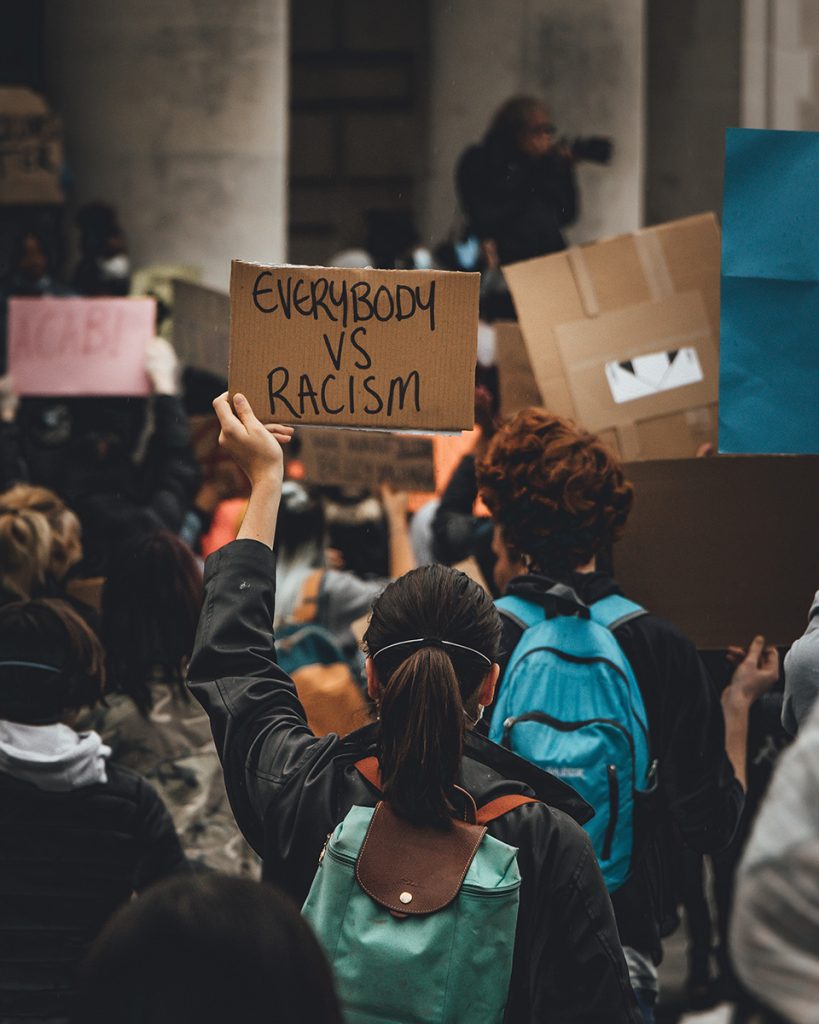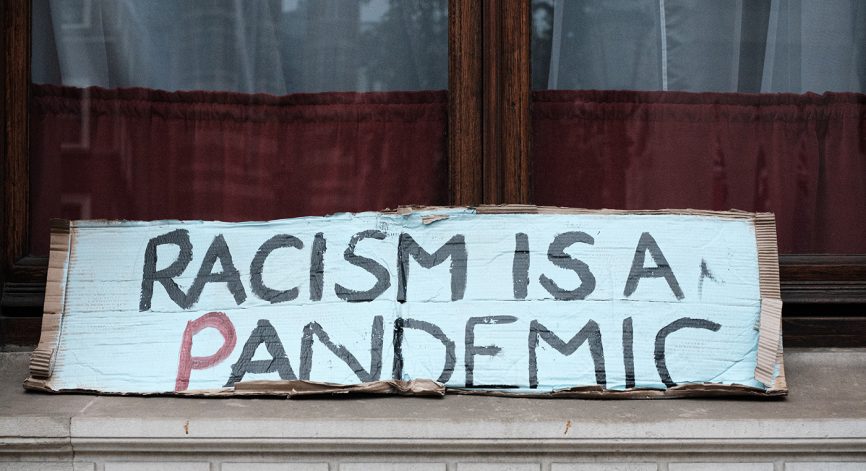by: Rev. Anna Golladay
I was in St Louis, MO this past weekend when I learned of a small UCC congregation in Holly Hills. Grace United Church of Christ was vandalized two weeks ago when someone painted “WHITE LIVES MATTER” on the outside wall of their building. The hate speech was put below banners calling for justice and inclusion, spanning a large portion of the brick wall. The Anti-Defamation League, an anti-hate organization, calls “White Lives Matter” a white supremacist phrase that originated in 2015 as a racist response to the Black Lives Matter movement.
Grace UCC isn’t the only congregation dealing with pushback around their stance on human rights. Other churches are dealing with protests, pushback, and online shaming because of their action and beliefs. In a time where the teachings of Jesus couldn’t be more necessary, we are watching a continued shift in tone around race in America.
It is likely time that we ask the difficult question again: What should the Church be doing? How should we respond? The answer isn’t simple, nor is it monolithic. There are three main areas that should guide our work: education, reconciliation, and abolition.
EDUCATION:
Many congregations are way ahead of the curve when it comes to area one: education. You are naming racism as the original sin from your pulpits. You have set up book studies using important texts like I’m Still Here: Black Dignity in a World Made for Whiteness, The Cross and the Lynching Tree, and Dear Church: A Love Letter from a Black Preacher to the Whitest Denomination in the U.S. If you are looking to expand your list, this is a wonderful resource. You are no longer afraid to have hard conversations in your small groups and you are committed to learning and, more importantly, unlearning the themes of racism that have built our communities. This education has encouraged us to repent for our and our ancestors’ role in systemic harm.
RECONCILIATION:
The United States Institute of Peace best defines reconciliation as “the long-term process by which the parties to a violent dispute build trust, learn to live cooperatively and create a stable peace. It can happen at the individual level, the community level, and the national level.”

The challenge is that this praxis is one that can easily be misconstrued as a “go along to get along” kind of approach. The less we rock the boat, the more amenable we are to compromise, the less we challenge racist systems, the quieter we are when we lose privilege – all are passive action that feels like the work of reconciliation. Yes, we should be starting with these things, but this must be the start of our work not the apex.
Reconciliation must ask questions about conflict resolution. If your congregation does not handle conflict well, how can you expect to hone your reconciliation muscles? Reconciliation must be undergirded by trust. Do you, without question, trust one another to act in the best interest of all? Do you find yourself suspicious of the motives of one another as you engage in anti-racist work? How does your congregation respond to a loss of privilege? These questions are important because if your congregation is not skilled in internal conflict resolution, you will likely struggle to be successful in racial reconciliation community-wide.
ABOLITION:
For some of you, this word feels aggressive. I’ve long heard congregations would prefer to use words like justice or action to illustrate how they intend to “be” in the world post-reconciliation. I contend that we must be physical accomplices in the work of anti-racism in order for our churches and communities to shift. We must abolish systems of harm, doing so with our minds, hearts and bodies. We need to take a hard look at what has gotten us to this place and then thwart, with all our being, the ability for those systems to continue. This looks different for all congregations depending on your setting, but it almost always includes several basic components:
- Public stances on racism in your midst
- Engagement with local government on policy reform
- Calls for police education and reform
- Housing initiatives that secure protections for communities of color
- Understanding your public school system and its role in the lives of children of color
- And more
To truly abolish racism from our churches and our neighborhoods, we have to be people who not only follow but live out the teachings of Jesus. Following the uprising of white supremacy in Charlottesville, Virginia, Russell Moore addressed the gap: “In a time like this, Christians might ask whether we should, in fact, be angry. Should we not instead just conclude that this is what a fallen world is like and pray for the final judgment to come? If you are feeling distressed and heated, you have reason to be. White supremacy makes Jesus angry.”
Yes, it makes Jesus angry. But does it make you angry? Does it make your congregation seethe? Does it make your denomination call for systemic change? What will it take for you to be able to answer a resounding YES to all these questions?
If you have started, but are at a standstill in your congregation’s path to anti-racism, Convergence has consultants that can help. If you are looking to partner with an organization that will help you take a critical look at your local landscape and help construct an anti-racism praxis, contact us today.


Comments
Right on!!!!!
Love Cameron’s weekly messages of educational information and resources. I left a UCC church in Temp, AZ during COVID and the George Floyd killing because I couldn’t get a meaningful discussion to happen in the church. I was chair of Justice and Witness at the time (was founder). I now attend a prominent Black church in downtown Phoenix, AZ and have
a wonderful connection with the Senior Pastor. I came from Upstate NY from an American Baptist background which is much more diverse and was used to interacting and working with congregations and people of color. Not an easy transition as I am sure my whiteness gets in the way for people. People are friendly on Sunday morning but it has not
transitioned into any kind of social interaction with laity, such as a cup of coffee or lunch together. to really get to know one another. I have tried. Have connected with the female pastor of Congregational Care and had lunch together. She is new in her position and this is a place where I can be supportive and share some of my gifts in her ministry efforts.
Sadly, we have a long ways to go in race relations. Keep up your good work..